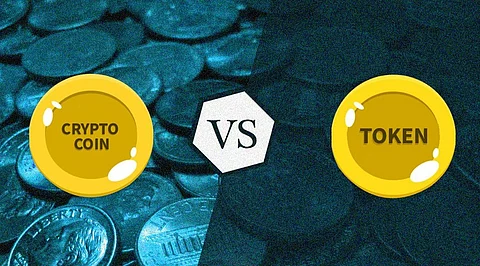Exploring the Difference Between Crypto Coins and Crypto Tokens
Here's a detailed understanding of crypto coins and crypto tokens to solve all confusion!
Cryptocurrency now is a fairly common term that we use in our daily lives. Most of us know about cryptocurrencies and how they are traded. Some of us even consider investing in it due to the lucrative economic gains and benefits. Even though new investors must thoroughly research legitimate cryptocurrencies and the market risks involved, it is equally important to understand the technical terms. There is a common confusion between crypto tokens and crypto coins. The difference between these usually comes down to their utility. Let us have a detailed view of the two species and understand the differences.
What is a Crypto Coin?
Cryptocurrency coins were initially created to be used as money. These coins help in paying for different goods and services, that can be used later and can also be divided into fractions of the whole. Some commonly known crypto coins are bitcoin, ether, dogecoin, and monero, to name a few. A crypto coin operates on the blockchain. The network keeps track of all the transactions that involve the native crypto coin. In many cases, crypto coins are not only used to pay transaction fees through the network but it is also used to incentivize users to keep the cryptocurrency network secure.
Coins usually build an independent infrastructure for themselves. They can decide how they come into existence, detect how secure they are from attacks, manage their supply, how their network transactions are recorded, and whom they reward.
Coins are decentralized and do not rely on any central issuing authority. They reply on code to manage issuance and transactions. It is either built on a blockchain or a DLT, that allows its users to enforce the rules of the system in an automated fashion. Coins also use cryptography technology to secure the cryptocurrency's underlying structure and network system.
What is Crypto Tokens?
Crypto tokens are very similar to cryptocurrencies, but they form a different digital asset category. Like coins, crypto tokens can also hold value and can be exchanged, but they generally represent physical assets, a utility, or a service. Some tokens even represent real estate and art. This process of creating tokens and assigning value to them is called tokenization.
Generally, crypto tokens are programmable, which means that they run on software protocols that are composed of smart contracts, that outline the features and the functions of the tokens and the network's rules of engagement. Anyone can participate in the system without the need for special credentials. Like coins, tokens are also decentralized and runs on the rules predefined by the network protocol.
So, What's the Difference Between the Two?
The difference between crypto coins and crypto tokens is not too vast, but if overlooked, it might cause huge complexities for the investors. One simple trick that can be used while the traders decide which one to use is, if it's a product, most often, they need to use the crypto coins, but if it's a service, the utility tokens can be used. The difference majorly lies in what they represent. While crypto coins are essentially digital versions of money, tokens stand for deeds or assets.
Join our WhatsApp Channel to get the latest news, exclusives and videos on WhatsApp
_____________
Disclaimer: Analytics Insight does not provide financial advice or guidance. Also note that the cryptocurrencies mentioned/listed on the website could potentially be scams, i.e. designed to induce you to invest financial resources that may be lost forever and not be recoverable once investments are made. You are responsible for conducting your own research (DYOR) before making any investments. Read more here.
.png)

